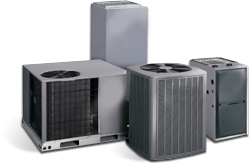Recently, I have been called several times by homeowners who have been advised that their system must be replaced, in at least two cases, to the tune of between 6 and 8 Grand. While the cost of newer, more efficient residential systems can certainly hit that range, the homeowner reported that the prior HVAC company had neither inspected the system nor inspected the ductwork. They simply asked how old the system was and flatly stated that a new system was necessary.
Imagine the homeowners’ delight and relief when one system simply required more Freon ($475) and the other required a capacitor replacement (less than $166)!
So for all you homeowners out there, whether you live in Rockville, Silver Spring, Bethesda, Potomac or anywhere in between, the rules remain the same when it comes to determining whether to replace or repair. Any reputable HVAC contractor should inspect your system and your ductwork, then discuss your options with you and the cost involved in either choice. If they don’t, call AMS! We will check your system and give you all of the relevant data to make an informed decision.
Considerations |
REPLACE |
REPAIR |
|
Age of system |
If the system is 12-20 years old and you have had multiple breakdowns within a short period of time, it is likely that that your system has reached the end of its lifespan. At this stage, repairs may be so costly or frequent, that they will, in the aggregate, be higher than paying for a new system. |
If the system is between 8-12 years old and has been maintained well over the years, you may not need a replacement yet. The HVAC contractor will check your system and give you the estimated price of fixing what is broken. |
|
Efficiency |
If you currently have a system that is less than 13 SEER, you may be losing between 20-60% more of your hard-earned money on electricity bills than necessary. Until 2006, 10 SEER was the standard rating; Federal law now mandates that all new systems must be at least 13 SEER. Systems SEER 16 and up may qualify you for a federal tax credit of $300 or more. |
If your system is 13 SEER or above and the estimated cost of repairs is far less than half the cost of a new system, you may want to simply repair the element. |
|
Condition of Ductwork & Insulation |
If your system does not seem to be cooling as efficiently or as evenly as it used to, it is not a particularly old system and it has been well maintained, your HVAC contractor should check the status of your ductwork and insulation. Often, the system itself works just fine but the air is not distributed effectively due to leaky ductwork or lack of proper insulation. Humidity and excessive dirt may also be signs of leaky ductwork. |
If your system is not cooling efficiently or evenly and your ductwork and insulation have been deemed house-worthy after a careful inspection, it may be a sign that you’re A/C system needs to be updated. |
|
Cost of particular kinds of repair |
Certain repairs are fairly straight forward *cleaning out or replacing air filter *unclogging or cleaning the drain *removal of debris clogging the condenser unit *replacement of capacitor *new thermostat *improvement of ductwork *fixing leaks in system and recharging the unit with refrigerant
|
If your air conditioner brand’s parts are out of warranty or have been discontinued, the cost of replacing them may be so high or improbable that replacement is recommended. For example if you are having your condensing unit replaced, many HVAC contractors will recommend an indoor air handler. If the matching indoor air handler no longer exists and there is no existing matching substitute, a replacement may be necessary. Absent a warranty on certain expensive parts, you may find it more cost-effective to invest in a new unit (particularly if it has higher efficiency). Examples of higher cost repairs: *blower motor *condenser, compressor *evaporator *condenser fan motor |
Some suggested government guidelines:
http://www.energystar.gov/index.cfm?c=heat_cool.pr_checklist_consumers










